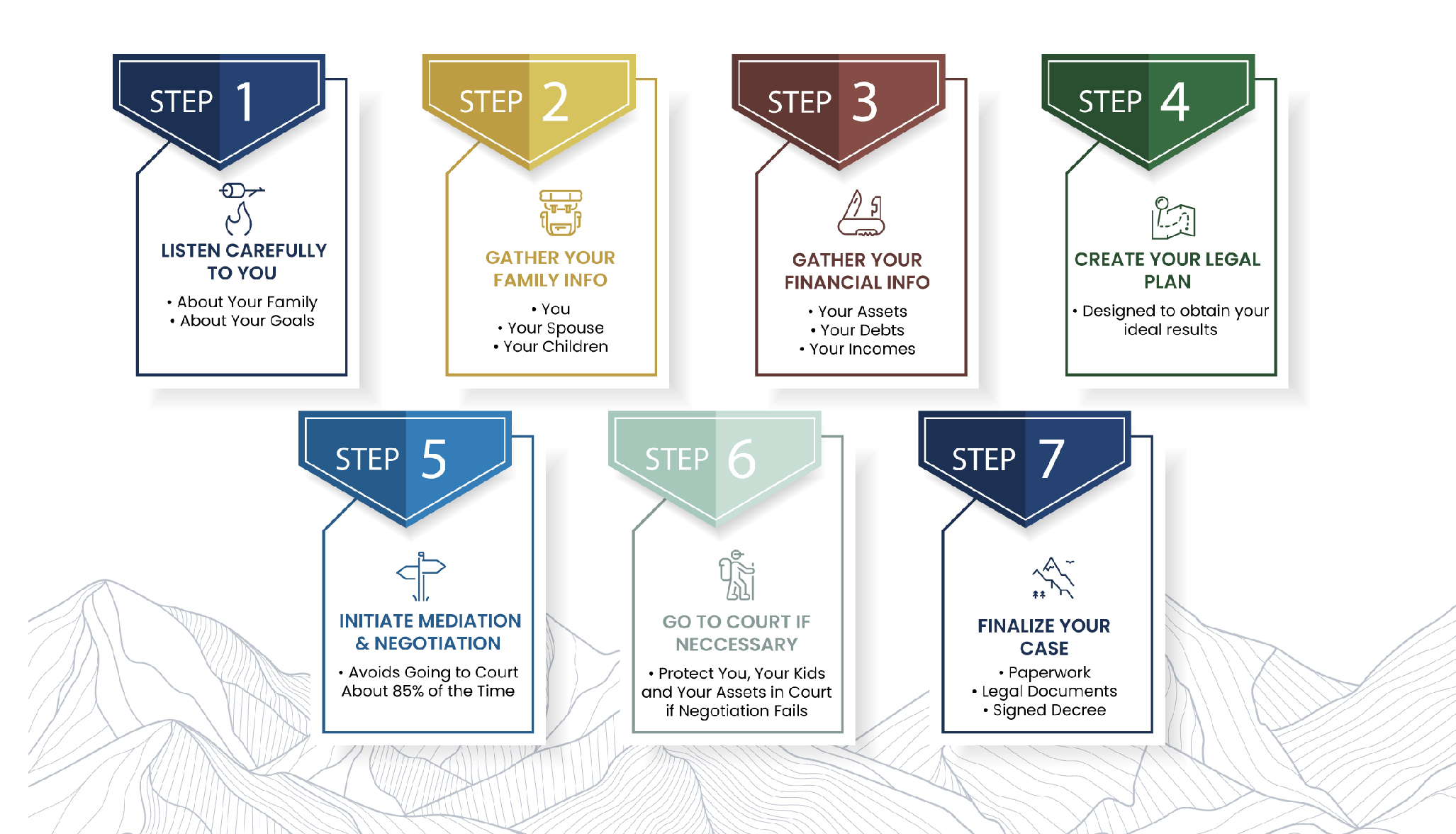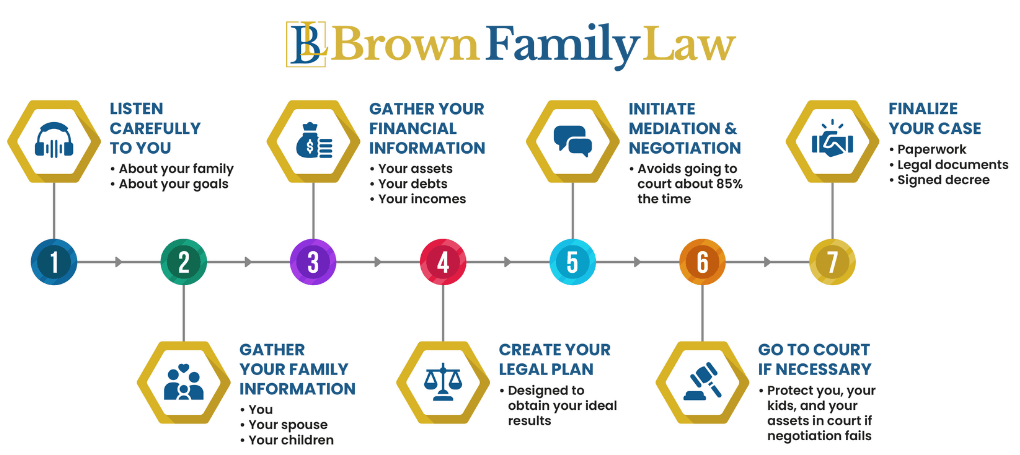Our Proven-Process For Helping You Through A Divorce
Our proven-process is designed to protect your money and maximize time with your kids

1. We Listen Carefully To You
- About Your Family
Though your family’s breakup is undoubtedly difficult, our team is committed to helping to ensure that the legal process proceeds as smoothly as possible for both you and your children. Our family law attorneys will listen carefully to your needs and goals, and work to create a custody arrangement that protects your rights as a parent and maximizes your time with your children. We understand that each situation is unique, and we’ll do everything we can to help you find a way that works for you and your family. - About Your Goals
When going through a breakup or child custody proceeding, it is important to define your goals for your family during this difficult time. After the time with your children, the next most important issue is your financial well-being. By setting some clear family (and financial) goals, we can make this happen for you. Maximizing time with your kids and your money will help you to move on with your life, develop more meaningful relationships with your children by influencing their development and education, and take care of yourself and your family financially after you’re done with the legal process.

3. Gather Your Financial Information
- Your Assets
Your assets include anything that you own and do not make payments on (if you make payments on something, it’s a debt). Examples of assets we need to know about: stocks, bonds, 401(k), retirement accounts, CDs, paid off cars, precious metals, cryptocurrency, artwork, paid off property or homes, businesses. Knowing your assets will help us determine everything from alimony to child custody, so please be thorough. - Your Debts
Like your assets, we need to know about each of your debts. A debt is anything you owe money on. So, if you owe money on your marital home, that’s a debt, just like if you owe money on your cars. Debts come in two types in divorce: premarital and marital. Premarital debt is debt incurred before the marriage, and marital debt is debt incurred during the marriage. We need to know about both types. We will need documentation regarding all debt so we can know exactly how much is owed at the time of separation. - Your Incomes
Your income will help determine child support and alimony, and it could affect asset and debt division, and even child custody. Income is any source from which you or your spouse receive money. Jobs are the primary source of income, but money from rental property, side jobs, trusts, dividends, etc. all would count as income.

5. Initiate Mediation and Negotiation
We have helped thousands of people through the divorce and custody process. While we are skilled trial attorneys, we always try to negotiate and mediate first. The reasons we do this are many: (1) it decreases cost to our clients, (2) it decreases the time needed to finalize the legal process, (3) it decreases fighting between spouses, and (4) it helps kids better deal with a very difficult emotional time.
We always start the negotiation process by attempting to schedule mediation. Mediation is a process in which a third-party neutral (i.e., not a judge) helps facilitate communication and negotiation so parties can resolve their case. We’re in one room with our client, and the other party is in another room with his or her attorney. Sitting in the same room together is almost never productive, so we sit apart.
Because of our focus on negotiation and mediation, 85% of our cases never see the inside of a courtroom. We find it’s usually unnecessary to go to court and air dirty laundry in public. The vast majority of our clients’ cases are resolved through one session of mediation. Sometimes, we need to go back to mediation multiple times, and that’s okay, because it keeps our clients from incurring the cost, time, and emotional stress of going to trial. Ultimately, about 1% of our clients go to trial, and 99% resolve their case through mediation.
Because mediation is such an important part of our clients’ cases, we spend a lot of time strategizing and preparing for mediation. We have spent years determining which mediators are the best for certain issues, attorneys, types of personalities, etc. We take our relationships with mediators very seriously because mediators are so integral to helping our clients resolve their cases.

7. Finalize Your Case
- Paperwork – Completed
Once we have resolved your divorce, either through negotiation and mediation, or through trial, the court will require legal paperwork spelling out your agreement or the result from trial. This paperwork usually consists of a Stipulation (i.e., agreement), Findings of Fact and Conclusions of Law, and a proposed Decree or Order. These legal documents are very important because they will be the basis for your final divorce decree. Because it is so important, we take a lot of time ensuring the paperwork is correct and reflects all aspects of your case. - Legal & Divorce Documents – Completed
After your attorney files the necessary legal paperwork, your judge will sign your Divorce Decree or Custody Order. This legal document is the order of the court, and you will be bound to follow what’s in it. We will ensure it is correct and then talk to you about it to make sure you understand what it says and know how to follow the orders contained in it.

2. Gather Your Family Information
- You
Once we know about your situation and what you want to accomplish in your case, we will need specific information about you and your family. We begin by getting information about you, your background, your education, your medical health, your work history, how you interact with your kids, etc. We need to know about you so we can help you through the legal process and help you obtain your ideal results. - Your Spouse
Like you, we need to know all about your spouse. What kind of relationship does your spouse have with your kids? What’s your spouse’s income? Does your spouse have any skeletons in the closet we need should know? All of this will help us put together a solid legal strategy to help you through your family’s process. - Your Children
If you have children, we need to get to know them. Who are they as individuals? What are their strengths and weaknesses? What kind of bond do they have with you both as parents? Do they have a preference where they would like to live? These are just some of the questions that will help us understand your family so we can obtain your ideal results in your case.

4. Create Your Legal Plan
- Designed to Obtain Your Ideal Results
The legal process of getting a divorce or establishing custody and parent-time can be overwhelming and confusing, especially if you are unsure what to do. You need an attorney with experience navigating the Utah divorce system to guide you through the process and help you to obtain your ideal results under the law. This is why Brown Family Law is designed how it is. We only do one thing as attorneys: family law. This exclusive focus allows us to create systems in which everyone and everything is built to get you your ideal results.
Once we have established an attorney–client relationship with you, and after we have gathered information from you and you, your family, and your finances, we will write a complaint for divorce. You’ll review the complaint to ensure it says exactly what you want it to say, and then we’ll file the complaint with the court. After that, we will serve the complaint on your spouse. This means we will give your spouse the papers, and this will start a clock. Your spouse will need to respond to the divorce complaint within a certain number of days, or the court will enter a default. A default means you get everything you asked for.
If your spouse responds instead of defaulting, and disagrees with some items you’ve asked for in your complaint, then that means you have a contested divorce. We will determine the best way for you to proceed in the legal process, but usually we go to mediation to negotiate. Utah courts require mediation, so we almost always start with it upfront. The way we prepare for and handle mediation has a very good track record of resolving cases without needing to go to court or trial where a judge decides your case.

6. Go To Court If Necessary
- Protect you, your kids, and your assets in court if negotiation fails.
Like we said above, we always try to negotiate and mediate divorce and child custody cases first. Usually, this is the best course of action for our clients because it: (1) decreases cost to our clients, (2) decreases the time needed to finalize the legal process, (3) decreases fighting between spouses, and (4) helps kids better deal with a very difficult emotional time.
Sometimes, however, mediating upfront is not the right thing to do. Sometimes, people withhold children from our clients, or clean out bank accounts, or kick our clients out of the marital home, or try to leave the state. When these types of situations occur, it’s usually in our client’s best interest to go before a commissioner or a judge. Going to court enables us to address serious problems quickly, which then allows us to negotiate with better leverage later on.
We are experienced trial attorneys at Brown Family Law, so we know our way around a courtroom. While we try very hard to minimize the acrimony that can go on during divorce litigation, we are fine going to court and fighting for our clients and their children. This is all part of the practice of law. We protect our clients and their families, in court and out. So, if it’s necessary to go to court or to trial to help our clients maximize the time they have with their kids and help our clients maximize their money, that is exactly what we will do.

“We’re Dedicated to Helping Remove the Fear Associated with Getting Divorced, by Protecting Your Finances and Maximizing the Time with Your Kids.”
Marco Brown
Managing Partner
Brown Family Law
Call Us For A Divorce Consultation: 801-685-9999 – Utah Office
Our Proven-Process For Helping You Through A Divorce
Our proven-process is designed to protect your money and maximize the time with your kids.


1. We Listen Carefully To You
- About Your Family
Though your family’s breakup is undoubtedly difficult, our team is committed to helping to ensure that the legal process proceeds as smoothly as possible for both you and your children. Our family law attorneys will listen carefully to your needs and goals, and work to create a custody arrangement that protects your rights as a parent and maximizes your time with your children. We understand that each situation is unique, and we’ll do everything we can to help you find a way that works for you and your family. - About Your Goals
When going through a breakup or child custody proceeding, it is important to define your goals for your family during this difficult time. After the time with your children, the next most important issue is your financial well-being. By setting some clear family (and financial) goals, we can make this happen for you. Maximizing time with your kids and your money will help you to move on with your life, develop more meaningful relationships with your children by influencing their development and education, and take care of yourself and your family financially after you’re done with the legal process.

2. Gather Your Family Information
- You
Once we know about your situation and what you want to accomplish in your case, we will need specific information about you and your family. We begin by getting information about you, your background, your education, your medical health, your work history, how you interact with your kids, etc. We need to know about you so we can help you through the legal process and help you obtain your ideal results. - Your Spouse
Like you, we need to know all about your spouse. What kind of relationship does your spouse have with your kids? What’s your spouse’s income? Does your spouse have any skeletons in the closet we need should know? All of this will help us put together a solid legal strategy to help you through your family’s process. - Your Children
If you have children, we need to get to know them. Who are they as individuals? What are their strengths and weaknesses? What kind of bond do they have with you both as parents? Do they have a preference where they would like to live? These are just some of the questions that will help us understand your family so we can obtain your ideal results in your case.

3. Gather Your Financial Information
- Your Assets
Your assets include anything that you own and do not make payments on (if you make payments on something, it’s a debt). Examples of assets we need to know about: stocks, bonds, 401(k), retirement accounts, CDs, paid off cars, precious metals, cryptocurrency, artwork, paid off property or homes, businesses. Knowing your assets will help us determine everything from alimony to child custody, so please be thorough. - Your Debts
Like your assets, we need to know about each of your debts. A debt is anything you owe money on. So, if you owe money on your marital home, that’s a debt, just like if you owe money on your cars. Debts come in two types in divorce: premarital and marital. Premarital debt is debt incurred before the marriage, and marital debt is debt incurred during the marriage. We need to know about both types. We will need documentation regarding all debt so we can know exactly how much is owed at the time of separation. - Your Incomes
Your income will help determine child support and alimony, and it could affect asset and debt division, and even child custody. Income is any source from which you or your spouse receive money. Jobs are the primary source of income, but money from rental property, side jobs, trusts, dividends, etc. all would count as income.

4. Create Your Legal Plan
- Designed to Obtain Your Ideal Results
The legal process of getting a divorce or establishing custody and parent-time can be overwhelming and confusing, especially if you are unsure what to do. You need an attorney with experience navigating the Utah divorce system to guide you through the process and help you to obtain your ideal results under the law. This is why Brown Family Law is designed how it is. We only do one thing as attorneys: family law. This exclusive focus allows us to create systems in which everyone and everything is built to get you your ideal results.
Once we have established an attorney–client relationship with you, and after we have gathered information from you and you, your family, and your finances, we will write a complaint for divorce. You’ll review the complaint to ensure it says exactly what you want it to say, and then we’ll file the complaint with the court. After that, we will serve the complaint on your spouse. This means we will give your spouse the papers, and this will start a clock. Your spouse will need to respond to the divorce complaint within a certain number of days, or the court will enter a default. A default means you get everything you asked for.
If your spouse responds instead of defaulting, and disagrees with some items you’ve asked for in your complaint, then that means you have a contested divorce. We will determine the best way for you to proceed in the legal process, but usually we go to mediation to negotiate. Utah courts require mediation, so we almost always start with it upfront. The way we prepare for and handle mediation has a very good track record of resolving cases without needing to go to court or trial where a judge decides your case.

5. Initiate Mediation and Negotiation
We have helped thousands of people through the divorce and custody process. While we are skilled trial attorneys, we always try to negotiate and mediate first. The reasons we do this are many: (1) it decreases cost to our clients, (2) it decreases the time needed to finalize the legal process, (3) it decreases fighting between spouses, and (4) it helps kids better deal with a very difficult emotional time.
We always start the negotiation process by attempting to schedule mediation. Mediation is a process in which a third-party neutral (i.e., not a judge) helps facilitate communication and negotiation so parties can resolve their case. We’re in one room with our client, and the other party is in another room with his or her attorney. Sitting in the same room together is almost never productive, so we sit apart.
Because of our focus on negotiation and mediation, 85% of our cases never see the inside of a courtroom. We find it’s usually unnecessary to go to court and air dirty laundry in public. The vast majority of our clients’ cases are resolved through one session of mediation. Sometimes, we need to go back to mediation multiple times, and that’s okay, because it keeps our clients from incurring the cost, time, and emotional stress of going to trial. Ultimately, about 1% of our clients go to trial, and 99% resolve their case through mediation.
Because mediation is such an important part of our clients’ cases, we spend a lot of time strategizing and preparing for mediation. We have spent years determining which mediators are the best for certain issues, attorneys, types of personalities, etc. We take our relationships with mediators very seriously because mediators are so integral to helping our clients resolve their cases.

6. Go To Court If Necessary
- Protect you, your kids, and your assets in court if negotiation fails.
Like we said above, we always try to negotiate and mediate divorce and child custody cases first. Usually, this is the best course of action for our clients because it: (1) decreases cost to our clients, (2) decreases the time needed to finalize the legal process, (3) decreases fighting between spouses, and (4) helps kids better deal with a very difficult emotional time.
Sometimes, however, mediating upfront is not the right thing to do. Sometimes, people withhold children from our clients, or clean out bank accounts, or kick our clients out of the marital home, or try to leave the state. When these types of situations occur, it’s usually in our client’s best interest to go before a commissioner or a judge. Going to court enables us to address serious problems quickly, which then allows us to negotiate with better leverage later on.
We are experienced trial attorneys at Brown Family Law, so we know our way around a courtroom. While we try very hard to minimize the acrimony that can go on during divorce litigation, we are fine going to court and fighting for our clients and their children. This is all part of the practice of law. We protect our clients and their families, in court and out. So, if it’s necessary to go to court or to trial to help our clients maximize the time they have with their kids and help our clients maximize their money, that is exactly what we will do.

7. Finalize Your Case
- Paperwork – Completed
Once we have resolved your divorce, either through negotiation and mediation, or through trial, the court will require legal paperwork spelling out your agreement or the result from trial. This paperwork usually consists of a Stipulation (i.e., agreement), Findings of Fact and Conclusions of Law, and a proposed Decree or Order. These legal documents are very important because they will be the basis for your final divorce decree. Because it is so important, we take a lot of time ensuring the paperwork is correct and reflects all aspects of your case. - Legal & Divorce Documents – Completed
After your attorney files the necessary legal paperwork, your judge will sign your Divorce Decree or Custody Order. This legal document is the order of the court, and you will be bound to follow what’s in it. We will ensure it is correct and then talk to you about it to make sure you understand what it says and know how to follow the orders contained in it.

“We’re Dedicated to Helping Remove the Fear Associated with Getting Divorced, by Protecting Your Finances and Maximizing the Time with Your Kids.”
Marco Brown
Managing Partner
Brown Family Law
Call Us For A Divorce Consultation: 801-685-9999 – Utah Office
